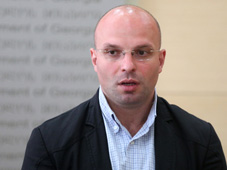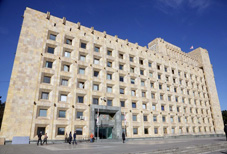
Head of Gov’t Administration to Close to Become New Chief Prosecutor
By Gvantsa Gabekhadze
Thursday, July 12
A Prosecutorial Council has selected Shalva Tadumadze for the post of a country’s new chief prosecutor, a decision grilled by the opposition and the civil sector, which believe that Tadumadze will be influenced by the government.
Tadumadze was among the three candidates selected by justice minister for the post, after the resignation of the former Chief Prosecutor Irakli Shotadze on May 31.
The three candidates were chosen from 18 nominees offered to the minister by the educational institutions and the civil sector.
12 out of 15 members of the Prosecutorial Council voted for Tadumadze, which means that now he needs to be approved by the Georgian Dream government and the parliament, where the ruling party has 116 seats in the 150-member legislative body.
The Prosecutorial Council had to choose between two candidates as the third candidate, former lawmaker Shalva Shavgulidze removed his candidacy several hours before the voting.
He said that the “decision was already made” and that the Prosecutorial Council ignored his legal demand to allow the media to live broadcast the voting process.
Tadumadze has served as a lawyer of the founder of the Georgian Dream coalition Bidzina Ivanishvili, when the letter decided to enter politics for the 2012 parliamentary elections.
He has been serving in the government of Georgia since then.
Justice Minister of Georgia Tea Tsulukiani, who chairs the Prosecutorial Council, confirmed that she is a godmother of Tadumadze’s daughter.
The opposition and the civil sector demanded the removal of the justice minister from the election process of a new chief prosecutor.
They also stated that an impartial person should have taken the post.
The amendments made to the law in 2015 read that the chief prosecutor must be elected, not appointed.
Shotadze was the first chief prosecutor of Georgia who was elected by the parliament of Georgia.
After the selection of three candidates, the prosecutorial council - also formed in the 2015 bill and chaired by the minister of justice - nominates one individual for the position.
Eight members of the council are prosecutors elected by the Conference of Prosecutors, which was also a new structure suggested in the bill.
Members of parliament (MPs) have two seats; one from the majority and one from the opposition, while one seat is held by a civil society representative and another from an academic. Two seats are occupied by judges of the High Council of Justice.
The council must approve one candidate by vote; the successful nominee must gain two thirds of the council’s support.
If this fails, the justice minister will be required to name three other candidates.
However, if selected, the chosen candidate will go before the government for approval. If the candidate is not approved, the process of selecting nominees begins again. If endorsed, the candidate must be approved by the parliament.


